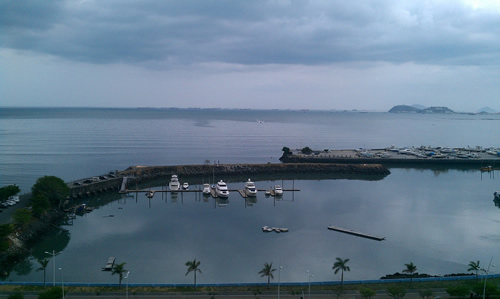Teaching English in Panama
Jobs are Plentiful, Pay is Reasonable
By Kevin Revolinski
 Panama
City bay. Panama
City bay.
|
Living in Panama is not as difficult
as one might suspect. Whether you are looking to relocate,
retire, or just spend a few months under the tropical
sun, you can easily support yourself as an English teacher.
I spent a year in Panama City. A short
drive from two oceans, it is ideal for snorkeling, surfing,
or just lounging on beaches. Tap water was drinkable, fresh
seafood plentiful, and work easy to come by. I lined up
a position with La
Universidad Tecnologica de Panama by email before I
arrived, and within weeks of my arrival, with very little
legwork, I found work at two other schools as well.
Credentials
Some of the teachers held TEFL certificates
but many had no credentials other than being a native speaker
(a few didn’t even have that).
Spanish is helpful but hardly necessary.
Many Panamanians know at least some English, and in the
classroom most schools demand that the teacher only speak
English with students.
Schools
The typical language school offers
afternoon, night, and weekend classes. Students range from
college age to older business people. Private primary and
secondary schools teach English as a language or use English
for other subjects. Generally, these schools prefer licensed
teachers but it never hurts to investigate.
Pay
Most commonly the 8-week language courses
meet twice a week for two to two and half hours each class.
Some pay hourly, others by the course. Either way, the going
rate is about $15-$16 per hour. Working five courses (which
is still only 25 hours of teaching each week) can make you
feel like a king.
Private Lessons
Another option for supplemental income
is private lessons. A fair rate is $15-$25 per hour. The
downside can be reliability. In the end I found it best
to try to get students to commit to two weeks or a month
at a time and pay ahead, but this is not always possible
since the average Panamanian lives paycheck to paycheck
(on the two national paydates each month the traffic and
nightlife is explosive).
Visas to Panama
Many foreigners end up working on the
sly. A tourist visa is valid for 90 days and renewable for
another 90 at the immigration office. Restarting the clock
on a tourist visa is as easy as a weekend in neighboring
Costa Rica. There are penalties for overstaying a visa.
Enforcement is inconsistent. For more information, see the U.S.
Department of State page for Panama.
To go the legal
route in Panama can be painstaking. Work visas cost
$100 at the time of this writing and require a copy of
your contract, a criminal background check from your
country of origin (in the U.S. these are free and can
usually be easily had from your local police before you
leave), and a Certificado de Buena Salud, which
one can get from a local doctor for a brief consultation
plus an HIV test. Additionally, the work visa applicant
must present two letters: one to Immigration (Direccion
Nacional de Migracion y Naturalizacion) requesting
a work visa for a visiting expert and a second to the
Labor Ministry (Ministerio de Trabajo y Desarrollo Laboral)
for a work permit (Permiso de Trabajo en Calidad
de Tecnico o Experto). Both letters justify the
need for a Panamanian company to hire you as a foreigner
who provides a service or expertise that could not be
provided by a Panamanian citizen. Both these letters
must be drawn up by a lawyer, and the fees can be expensive.
A majority of the foreign teachers I met never bothered
with the whole process, preferring a weekend in Costa
Rica or a fine upon their departure from Panama.
KEVIN REVOLINSKI is
a sometimes teacher, sometimes writer who has taught
English in Turkey, Panama, Italy, and Guatemala.
|
